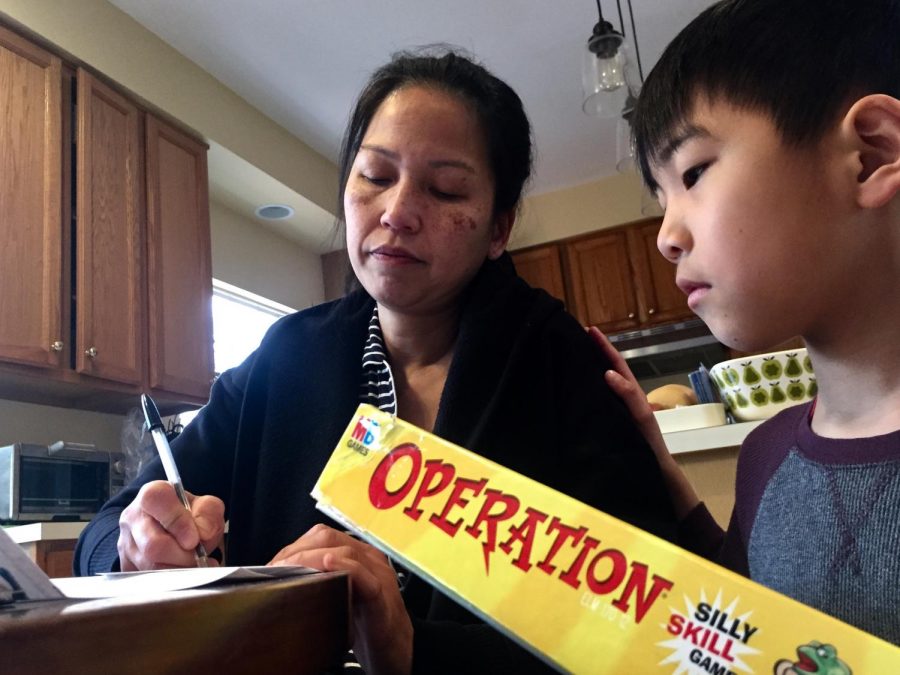Your donation will support the student journalists of The Tide, Richard Montgomery High School's student newspaper. Your contribution will allow us to purchase equipment and cover our annual website hosting costs.
The impact of COVID-19 on working parents
January 3, 2021
During COVID-19, parents have had both their parenting and working lives face dramatic changes.
The COVID-19 pandemic has affected everyone’s lives in one way or another. For working parents, daily routines have been completely overhauled. Parents have had both their parenting and working lives face dramatic changes.
Some parents are reducing their working hours or quitting their jobs entirely, while others are trying to balance new work environments with creative parenting techniques. Ultimately, many overwhelmed working parents feel they aren’t adequately performing either of their roles.
According to the Pew Research Center, the number of parents employed and at work in the U.S. dropped by almost 7 percent between Sept. 2019 and Sept. 2020. Although part of this can be attributed to the economic downturn caused by the pandemic, many parents have quit working or reduced their hours to help with their children’s online learning experiences.
Lisa MacFarlane is a social studies teacher at Richard Montgomery. She has two sons, one in fifth grade and one in second grade, who are both in virtual learning this semester. Her husband helps with their kids’ online school in the morning, but in the afternoon, MacFarlane has to balance teaching her high school students and helping her kids.
“And then it’s just me teaching, running upstairs to make sure the kids got on their Zoom okay, pingponging back and forth,” MacFarlane said.
With all of those responsibilities to manage simultaneously, some working parents find that they are not as productive with their jobs as they were before the pandemic. Social studies teacher Noah Grosfeld-Katz is a father to two sons, four and two years old. Although they attend daycare every day, Grosfeld-Katz has noticed that they sometimes make it harder for him to work from home.
“When my kids are around, it’s sometimes taking me over an hour to write one work email, where at school it would take me ten minutes,” Grosfeld-Katz said.
Similarly, MacFarlane’s parental responsibilities sometimes distract her from accomplishing her work in ways unique to the pandemic. “With work in the past, you know, as teachers, we get our planning periods during the school day to grade and plan and go to meetings and do what we need to do,” MacFarlane said. “But now in my planning periods, I just run upstairs and help my kids with school, so it takes me away from work.”
Not only does it impact their work, but the exhaustion created by all of these responsibilities can also take a toll on working parents’ interactions with their kids. From toddlers to high schoolers, all kids need certain types of support. However, overworked, busy parents don’t always have the energy to provide that support.
“I personally find that when the kids get home from daycare, I have these goals of, okay I want to practice reading with my older son, I want to play with trains with my younger son, I want to play games, all this stuff. But I’m tired. I’m just tired,” Grosfeld-Katz said.
In the end, some working parents fear that they are spreading themselves too thin. “I feel like I should be taking care of my own children, but I’ve got so much school work to do, or I feel like I should be doing a better job with my lessons and be giving more feedback to my RM students, but then I’m ignoring my own two kids,” MacFarlane said. “I think the pandemic has really heightened that for working moms. We feel like we’re just failing everybody.”
However, some parents think that once the pandemic ends and some normalcy returns, their working and parenting lives will once again find a balance. “I’ve heard good things about the vaccine,” MacFarlane said. “We just have to accept it and deal with it, and better times are ahead.”
